Types of InterjectionThe interjection is described as "a term used to indicate a certain emotion or mood on the part of the speaking individual. An interjection is a part of speech often used to communicate a certain emotion or expression of the person speaking to the readers (such as surprise, delight, enthusiasm, disgust, zeal, grief, approval, calling, attention, and so on). It is often used as a single term or non-sentence phrase, accompanied by a punctuation mark. Interjection verbs are typically used at the beginning of a phrase. 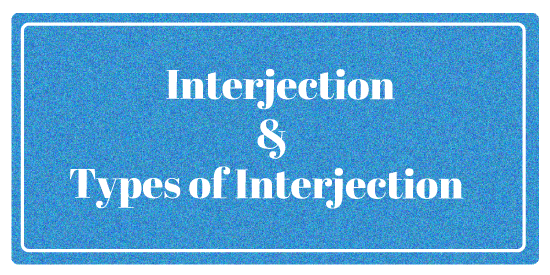
A comma or an exclamation point (for a moderate interjection). Following the usage of an interjection term in a phrase, a comma (for mild interjections) or an exclamation (for shocking, emotive, or deep feelings interjections) is used. Other interjection terms used as opening statements include yeah, no, well, indeed, and so on. They are one-of-a-kind and have several intriguing characteristics:
One can even employ a noun, a verb, or an adverb as an interjection. Noun as an interjection : Childishness! You should not have complained to the grandfather. Verb as an interjection : Clap! For this achievement, she deserves some praise. Adverb as an interjection : No! You are not permitted to enter that building until I give you the right. Interjections are words used in spoken language to express our immediate reaction to anything that affects our emotions. They are the initial response and do not always make sense. On the other hand, interjections are inappropriate in formal speech or writing. Types of InterjectionsInterjection can be divided into several kinds on various principles. 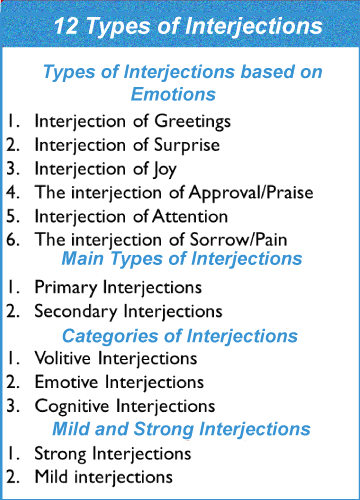
There are two kinds of it, and they are as follows : 1. Primary InterjectionThis type of interjection refers to the terms that are entirely interjections and cannot be categorized as any other Part of Speech. Primary Interjections Lis
Examples:
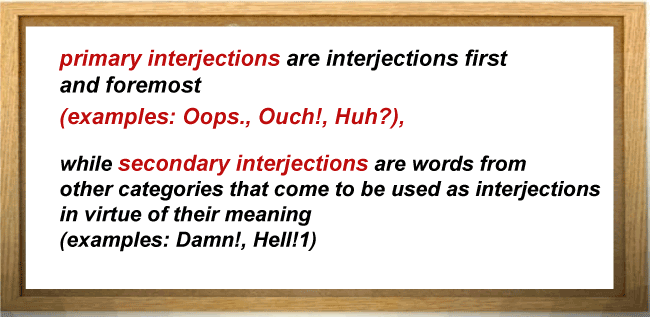
2. Secondary InterjectionSecondary Interjections are nouns, adjectives, and other parts of speech that behave as interjections at certain times. Examples:
Interjections are classified into two groups based on the severity of the expressions 1. Mild InterjectionModerate Interjections are the comparatively mild expressions of sentiments and emotions. Commas are used to divide these categories from the remaining of the statement. Examples:
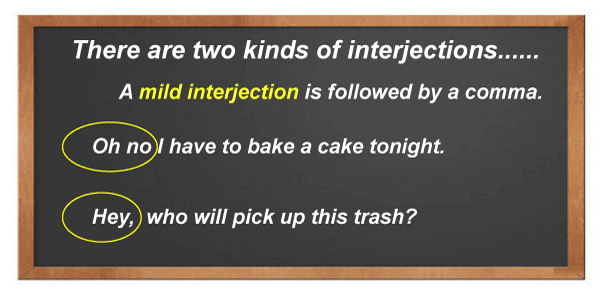
2. Strong InterjectionForceful Interjections are defined as strong eruptions of expression. Exclamation marks are used to separate these categories from the remaining of the phrase. Examples :
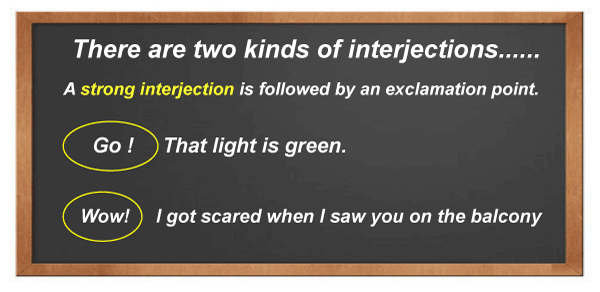
Interjections are classified into three types based on the emotions conveyed 1. Volitive InterjectionVolitive Interjections are commonly used to communicate commands, requests, and wants. "I wish" statements are substituted with Volitive Interjections in the conversation. "Enough" shows a desire to quit listening to someone and possibly make a counter-statement. "Shoo" usually showcases the speaking person's desire to drive somebody away. 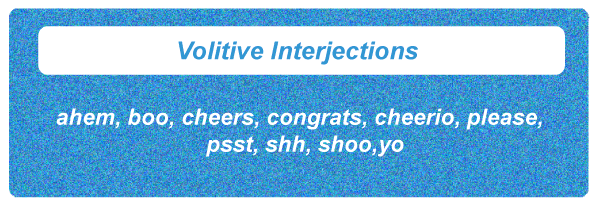
Examples:
2. Interjection of Emotion or Emotive InterjectionEmotive Interjections are phrases used to express unexpected bursts of emotion such as surprise, happiness, grief, disgust, and terror. In the speech, these sorts typically replace "I feel" phrases. "Eww" indicates "I feel sickened," and "Phew" signifies "I feel relieved." 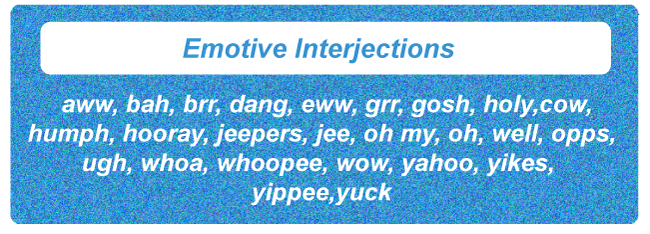
Examples:
3. Cognitive InterjectionCognitive Interjections are terms that emerge from thought and are utilized as exclamations. These sorts are employed to express feelings and emotions that people encounter and comprehend via experience. 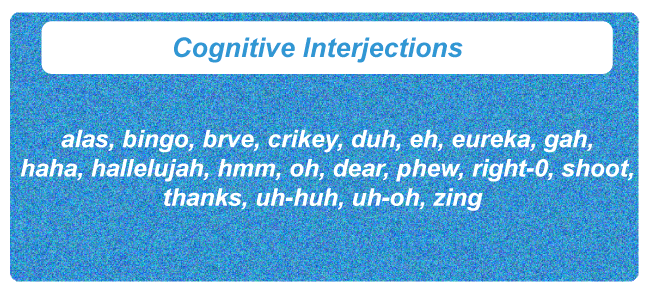
Examples:
The interjections can be classified as follows on the basis of how the feelings are expressed 1. The Interjection of GreetingThe greeting interjection indicates the feeling of warmth and joy in meeting with anyone. Hello! Hi, Hey, Heya! and so on. These are few of the examples of this kind of interjection ;
2. The Interjection of JoyThe interjection of joy is used to communicate immediate delight and gladness on a specific occasion. Wow ! Congratulations ! Cheers ! Good ! Hurray ! These are some of the examples of this type of interjection
3. The Attention InterjectionThe attention interjection is used to draw somebody's attention towards us. See! Listen! Hush! Behold! Shh! and so on. Examples ,
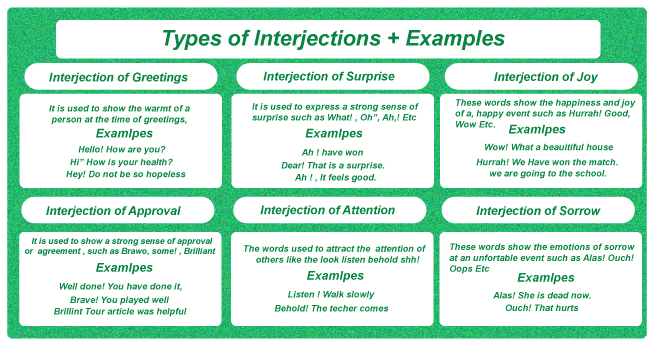
4. The Approval InterjectionThe approval interjection is used to show approval or consent in a statement. Bravo ! Good work ! Brilliant! and so on These are some of the examples of this type of interjection
5. The Interjection of SurpriseThe surprise interjection is used to show surprise at any situation that has occurred. Oh ! What ! Ah ! Ha! and so on. These are few of the examples of this kind of interjection
6. The Sorrow InterjectionIn a statement, the interjection of sorrow is used to communicate the sense of sadness that something horrible had occurred. Ah!, Damn!, Alas!, Ugh! oops! and so on. Examples ,
List Of InterjectionsAs broadly stated, interjections can be categorized on the various principles and basis. Moreover, the list of interjections can be exhaustive, and their usage depends on the situation and need. Let us have a look at the list of interjections irrespective of their type.
3 Ways to Punctuate Interjections ProperlySince there are many forms of interjections, there are also various ways to mark them. 1. Using an Exclamation MarkFor interjections, the exclamation mark is the most widely used punctuation mark. It is obviously used to express strong emotions like surprise, enthusiasm, or fury. Examples:
2. Using A Period or A Comma as A Punctuation MarkA period or comma will suffice for lesser emotions. Examples:
3. Using A Question Mark as A Punctuation MarkA question mark is more suitable when using interjections to show uncertainty or doubt. Examples :
4 Interjection Usage GuidelinesSome guidelines for utilizing interjections correctly:
As an instance, consider the line "I like that dog." This sentence appears comprehensive and delivers its whole meaning, yet it lacks that extra sense of excitement. Interjection ExampleOh my goodness! I like that outfit ! Wow! Look at that dog ! Use of wow and oh my god shows a strong feeling of excitement.
Next TopicDeterminers
|
 For Videos Join Our Youtube Channel: Join Now
For Videos Join Our Youtube Channel: Join Now
Feedback
- Send your Feedback to [email protected]
Help Others, Please Share










